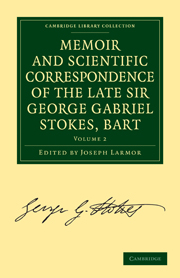 Memoir and Scientific Correspondence of the Late Sir George Gabriel Stokes, Bart.
Memoir and Scientific Correspondence of the Late Sir George Gabriel Stokes, Bart. Published online by Cambridge University Press: 05 October 2010
On The Uses Of Harmonic Analysis.
Submitted—The following memorandum by Professor Stokes :
Meteorological elements may be considered and discussed from two points of view. We may either contemplate the progress of the changes at any particular time, as, for example, in tracing the history of a particular storm, or in endeavouring to make out general laws connecting the changes of the various elements, such as Buys Ballot's Law; or we may seek to deduce from large masses of observations regular fluctuations which underlie the total fluctuations presented as the immediate result of observation, of which last a more or less considerable part have no immediate relation to the time, but in contemplating the regular periodic fluctuations are to be regarded as casual.
For the first object great accuracy is not required; what we want is to get a general comprehensive view; and this is afforded in a very available form by the published diagrams. Moreover, for this object means are useless, or very nearly so.
It is for the second object that the publication of hourly results is chiefly, if not exclusively, demanded. Besides the more obvious regular changes which have long been known, investigators may wish to examine whether there may not be other regular periodic changes which may be discovered by discussing a great number of observations.
Suppose now the results for each day were subjected to harmonic analysis, and the numbers read off on the cylinders of the machine alone published, we should have five or seven numbers (according as the analysis was carried to the second or third order) to publish, instead of 24.
To save this book to your Kindle, first ensure [email protected] is added to your Approved Personal Document E-mail List under your Personal Document Settings on the Manage Your Content and Devices page of your Amazon account. Then enter the ‘name’ part of your Kindle email address below. Find out more about saving to your Kindle.
Note you can select to save to either the @free.kindle.com or @kindle.com variations. ‘@free.kindle.com’ emails are free but can only be saved to your device when it is connected to wi-fi. ‘@kindle.com’ emails can be delivered even when you are not connected to wi-fi, but note that service fees apply.
Find out more about the Kindle Personal Document Service.
To save content items to your account, please confirm that you agree to abide by our usage policies. If this is the first time you use this feature, you will be asked to authorise Cambridge Core to connect with your account. Find out more about saving content to Dropbox.
To save content items to your account, please confirm that you agree to abide by our usage policies. If this is the first time you use this feature, you will be asked to authorise Cambridge Core to connect with your account. Find out more about saving content to Google Drive.